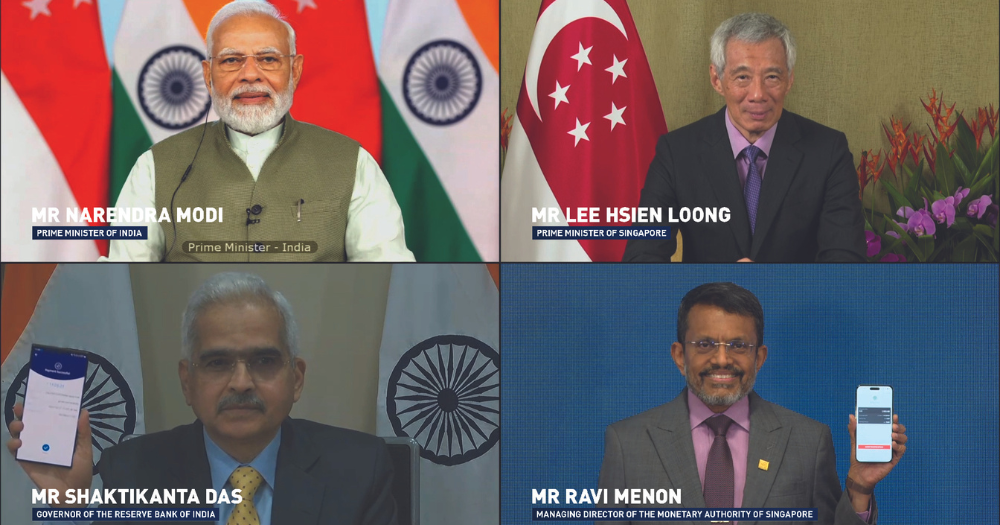Follow us on Telegram for the latest updates: https://t.me/mothershipsg
The Monetary Authority of Singapore (MAS) and the Reserve Bank of India (RBI) launched a link between Singapore's PayNow and India's Unified Payments Interface (UPI), in a press release by MAS today (Feb. 21).
This will help customers of participating financial institutions in Singapore and India to send and receive funds between bank accounts or e-wallets across the two countries in real time.
Speaking at the launch, Prime Minister Lee Hsien Loong shared that cross-border retail payments and remittances between Singapore and India amount to over US$1 billion annually.
"The PayNow-UPI linkage will offer cheaper, faster, and safer cross-border retail payments and remittances for businesses and individuals alike," said PM Lee.
"It is convenience at your finger-tips," he said.
World's first real-time payment systems linkage using scalable cloud-based infrastructure
PM Lee and Indian PM Narendra Modi officiated the virtual launch.
"The idea of linking PayNow and UPI was first conceived in 2018, when PM Modi visited Singapore", PM Lee noted.
MAS Managing Director Ravi Menon and RBI Governor Shaktikanta Das executed a live cross-border fund transfer to each other from Singapore and India.
The PayNow-UPI linkage is the world's first payment systems linkage that uses a scalable cloud-based infrastructure which can accommodate large volumes of remittance traffic.
Singapore's participating financial institutions are DBS Bank and Liquid Group, with Liquid Group being the first non-bank financial institution to participate.
India's participants are Axis Bank, DBS India, ICICI Bank, Indian Bank, Indian Overseas Bank and State Bank of India.
Safe and cost-effective way to transfer funds
The link provides customers a safe, simple, cost-effective way to transfer funds across borders.
Customers can make the cross-border transfer using a mobile phone number, UPI identity or a Virtual Payment Address.
Participating financial institutions are committed to ensuring that the service is cost-efficient and accessible to all, including foreign workers and students residing in Singapore and India.
This will help them make and receive low-cost cross-border remittances to and from their home countries.
Service available under a phased approach
The PayNow-UPI service will be progressively made available to Singapore customers of DBS Bank and Liquid Group.
Participating institutions will slowly increase the numbers of eligible user groups and transaction limits from Feb. 21 till Mar. 31, 2023.
At launch, selected DBS customers can transfer up to S$200 per transaction, capped at S$500 per day.
Indian customers can receive funds through the service from the get-go.
Sending funds from India is currently limited to customers of ICICI Bank, Indian Bank, Indian Overseas Bank and State Bank of India, with the scope to be gradually expanded.
MAS and RBI will review and progressively scale the linkage by increasing the number of participating financial institutions and applicable use cases.
"I hope this strong partnership between Singapore and India will continue to spawn innovative technology solutions and create more cross-border opportunities for our digital economies," said PM Lee.
Strong, forward-looking relationship between Singapore and India
PM Lee and Indian PM Modi had a telephone call in conjunction with the joint virtual launch of the PayNow-UPI linkage.
In a press release by Singapore's Ministry of Foreign Affairs, the PMs reaffirmed the "strong, broad-based and forward-looking relationship between Singapore and India".
MFA also said that the PMs noted the value of the India-Singapore Ministerial Roundtable as a platform to engage in new bilateral initiatives.
Top photos via Monetary Authority of Singapore (MAS).
If you like what you read, follow us on Facebook, Instagram, Twitter and Telegram to get the latest updates.
